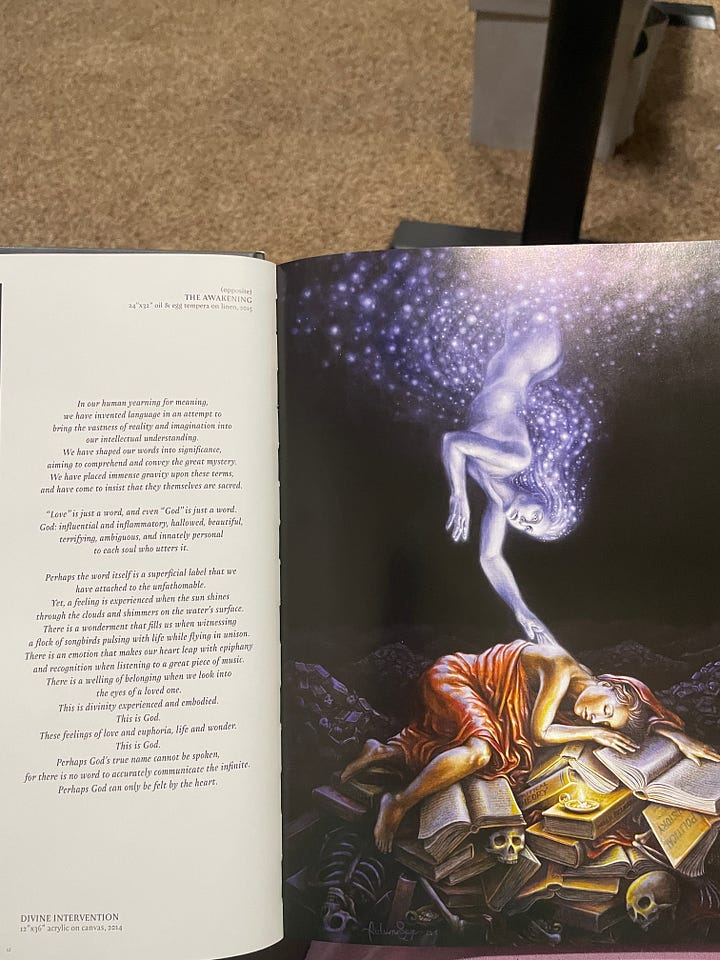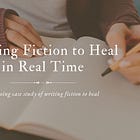If you’re new to The Rebel MFA Way, welcome! This is an essay in my ongoing “Writing Fiction to Heal in Real Time” series where I deep-dive into my writing fiction to heal method as field work and a case study. To begin, I will be working through my story, The Archive, which you can find more information on here.
[NOTE: Your email provider may truncate this essay, be sure to click on “keep reading” to read the entire piece.]
Swimming with the “What-ifs?”
Last week, I talked about how the idea for my serialized writing fiction to heal story, The Archive started back in 2017, but I didn’t start getting serious about writing it until recently.
I asked: “How do we start building something from nothing?”
My answer is: We swim with the “what-ifs”
And by this, I don’t necessarily mean what-ifs as it relates to plot or setting or even surface-level character information. I’m talking about the juicy, meaty what-ifs that you reserve for your journal… the questions that keep you up at night. The mysteries you seek to find answers to. The scenarios that scare the hell out of you.
Remember, this is a writing fiction to heal story — which means that the typical “expectations” you put on writing a novel, for example, do not apply. The point isn’t to produce something that you will sell or publish (though that’s a beautiful side effect if it does happen). The point is to HEAL.
And in order to write to heal, you have to be willing to dig. And then dig deeper.
You still might be wondering… okay, Jade, but what does this actually look like?
I’m so glad you asked! Because I’m going to literally “show” you through my real-life examples.
I learned through the process of writing “Forged in Fire: Writing Fiction to Heal” that sharing examples of real work is helpful and valuable for the reader, but it’s scary AF for me. It’s vulnerable enough to put out a polished or semi-polished piece of writing. It’s incredibly terrifying to put out real thoughts and observations and questions you’re grappling with on a personal level and trying to work with in a novel.
So please be kind. Remember that there is actually a person behind these examples. And I’m writing/building/exploring this story in real time — just as you are!
Note: After writing the first draft, I realized that this needs to be a two-parter essay. There’s a lot to dig into here!
Without further ado, this is how I “swim with my what-ifs”
indulgence.
In books. movies. tv. essays. think pieces. podcasts. art. sex. weed. tedtalks. napping. daydreaming.
I indulge (heavily) in the creations of others as much (if not more) than I do sitting with my own self and creations.1
There is a direct connection between the erotic (which doesn’t always mean sex, but can), sensuality, and creativity. When we do things that make us feel good or alive or make us question things — when we have moments of genuine pleasure — that spills over into our creative lives.2
More than that, though, is the inspiration and potential “what-ifs” that come from other people’s creativity. And yes, it even influences our own writing. Most people think this is a bad thing, but look, everything we create in life is an imitation. But only you have the ability to make it your own.
In fact, sometimes someone’s creation inspires you with such totality… with such a deep knowing in your bones, that you lean into it. That’s why you’ll see many references to Octavia Butler and her Parable series in The Archive. I gave my deep love and obsession for the books to Ari to examine for the same reasons that I’ve been examining them.
When I began to think of this new “normal” for my characters — I immediately thought of the film Civil War. Even seemingly “unrelated” past work can influence your current work because I did a whole podcast episode on how much I loved that movie and the questions it brought up for me.
Here’s some of what didn’t make it into the podcast episode [from a draft script]
I know there’s a lot of people who might say that the “world” in Civil War is too far-fetched. Unrealistic. But for me, it felt visceral and real and terrifying. Way more than say the worlds in Walking Dead or A Quiet Place, etc. It’s the subtle things, too, that I think about. Like when they go into that one town in the midwest to shop and everyone is acting like the world isn’t falling apart because they are off-the-beaten path, have armed guards and choose to ignore it. It’s the scene with the guys at the truck stop who have men strung up and bloodied in the carwash. Oh god, it’s the fucking guy Jesse Plemons plays. Oh god. That scene. THAT is what fucking terrifies me. Not the end of the world. The end of humanity.
That film still scares me. But now, I’m forcing myself to use it as a visual touchpoint for my character because if I’m terrified of it, then so will she.
soundtracks.
I create what I call my “book soundtrack” — the music that accompanies what I’m writing. I’m very inspired by music and it can send me into “writing” mode faster than anything else can. I’m obsessive about it. I listen to my “book soundtrack” as much as I can. In the shower, doing dishes/laundry, before bed, when I wake up in the morning. I find that constantly surrounding myself with the music as a “backdrop” to the writing is effective in helping me map out emotional or “high-octane” scenes as I call them. My soundtracks evolve as I have a quirk of moving the songs around in order to suite the “vibe” of particular scenes.
active imagination.
I utilize meditation, active imagination, and pathworking exercises to help me visualize and “see” the story and characters that are coming to life. I “meet” with my characters and talk to them. I ask them questions. I treat them as if they are living, breathing people in my own reality.
One of the easiest entry points into pathworking (in my experience) is using oracle/tarot decks or artwork.
Autumn Skye is one of my favorite artists and her paintings provide me with so much inspiration. I’ve used her work often for pathworking stories. In particular though, I have her framed print, The Awakening, in my office.
I don’t know how many times I’ve pathworked with this image, but it has become an important part of my (and Ari’s) story. The woman in the painting is me. She is Ari. She is the essence of the beating heart of the story. I recently received Autumn’s book, Art & Soul and the accompanying words to this image is stunning. It also creates a thread to one of my “hard questions” that I will talk about next week.


interviewing characters.
You’ve probably heard this advice from writing teachers, worksheets, workbooks, etc. Those are great and all, but I’m not talking about those interviews.
I’m talking about the kind of interview that unfolds over time, as you’re getting to know the characters as real people. It’s kind of like dating [except in my case, I go straight for the jugular with my deep, probing questions].
Here’s a snippet of one such interview I did early on with Ari as I was still envisioning how her story might look:
What scares you the most about being alone?
Honestly, I was born a natural hermit, so not being around people isn’t as much of a concern for me as it might be for many. That being said, the people I care deeply about in my life know me for me and love me for that. So, living without “my person” (my husband) terrifies me. That I’m utterly on my own and the only person who truly understands me is gone. And yes, having to figure out everything on my own is scary!
Do you think you’re someone who can survive? Why or why not?
Ha. I don’t have a chance in hell. I don’t have any “life skills” that would help me prosper or even find help from others or add skills to a collective or whatever.
There are a lot of things I think I could learn and be “good enough” at like figuring out how to cook and eat, how to live without essentials like toilet paper, showers, etc.
But mostly… I think I would die rather quickly.
If you could magically have one survival skill right now, what would it be?
I think the most helpful skill to have in a post-apocalyptic world is a very keen sense of intuition for the next right steps. Whether that’s literally, “it’s time to hide right now” or “run, run, run” or “kill that mouse or you will go hungry.”
What’s a memory or skill from your pre-apocalypse life that you think might help you now?
I think because I am a voracious reader and am good at researching and finding things — this could be a valuable skill. People say books will be obsolete when the world ends, but I think it might actually be what saves people.
Next time…
I’ll continue to lay out how to “swim with the what-ifs” through other, more advanced actions like, roleplaying with Ai, asking hard questions, and seeing your characters and story through new lenses.
Don’t want to get these email notifications? Or maybe you want to make sure you get these notifications? Manage your notification settings here:
To read the backstory to why I’m writing this series:
To read the backstory on why I’m serializing “The Archive,”:
I know there are A LOT of writers, teachers, professors, armchair psychologists (ha) who say that indulging in creations of others can result in you never actually creating… but I’ve never found that to be the case for myself. In fact, if anything, the more I consume creations by others, the more creative I am with my own creations. And it’s almost never an apples for apples parallel either. One time, I got a horror idea from a cheesy rom-com. So yes, I teach and advocate for heavy consumption of whatever lights you up the most. If you feel like it’s causing you to consume rather than create, then maybe take a look at it. But if you find yourself in a good ratio — keep going.
There’s a fabulous post about this from Erica Perry at The Arcane. I read it when it was free, but it’s behind a paywall now. If you’re interested:











You are fearless in getting your stories. I freaking love that!